Our Team
Jesse Reimer, M.Sc.

Research Assistant
Once upon a time, a microbiology class got Jesse interested in microbes in the natural environment. From there, he learned that microbes have the potential to help many environmental problems and improve sustainability in the world. Whether it’s by reducing greenhouse gas emissions, sequestering soil C, improving crop nutrient uptake, or degrading environmental contaminants – these tiny organisms can have a large impact through strength in numbers. Little guys, big impact. This led Jesse to pursue MSc studies under Dr. Helgason and Dr. Arcand, where he researched pasture greenhouse gas emissions from a microbial perspective as part of a collaborative, whole-system study. Here he honed his skills in molecular biology, biogeochemistry, isotope tracing, and microbial ecology. Since defending, Jesse has continued to work as a Research Tech in Dr. Helgason’s lab, further feeding his interest in the unseen universe that lies beneath our feet.
Tram Thai

PhD Student
Tram is a Ph.D. student in Soil Science at the University of Saskatchewan. Tram is involved in the Agricultural Greenhouse Gases Project (AGGP) where her project is looking at the microbial indicators for greenhouse gases control and carbon and nitrogen cycling under grazed legume/grass pasture in Saskatchewan, as well as the causal relationship between changing forage management practices (bloat legume, alfalfa, to non-bloat legumes, cicer milkvetch and sainfoin) and GHG emission. This critical information will help shape management practices in Saskatchewan forage pasture towards mitigating greenhouse gas emission and will benefit local beef producers with a better adaptation to climate change. Tram completed her MSc in Agricultural Studies at the University of Lethbridge and her B.A in Agronomy in her home country – Vietnam. Before joining University of Saskatchewan, she had worked for 5 years as a research assistant at Thai Nguyen University, Vietnam and 3 years as a research associate at Agriculture and Agri-Food Canada at Lethbridge. Tram enjoys spending time outdoors such as hiking, camping, boating, and exploring the beauty of nature scenery in Canada, in which visiting all national parks in Canada is one of the main goals in her life.
Mostafa Hojati
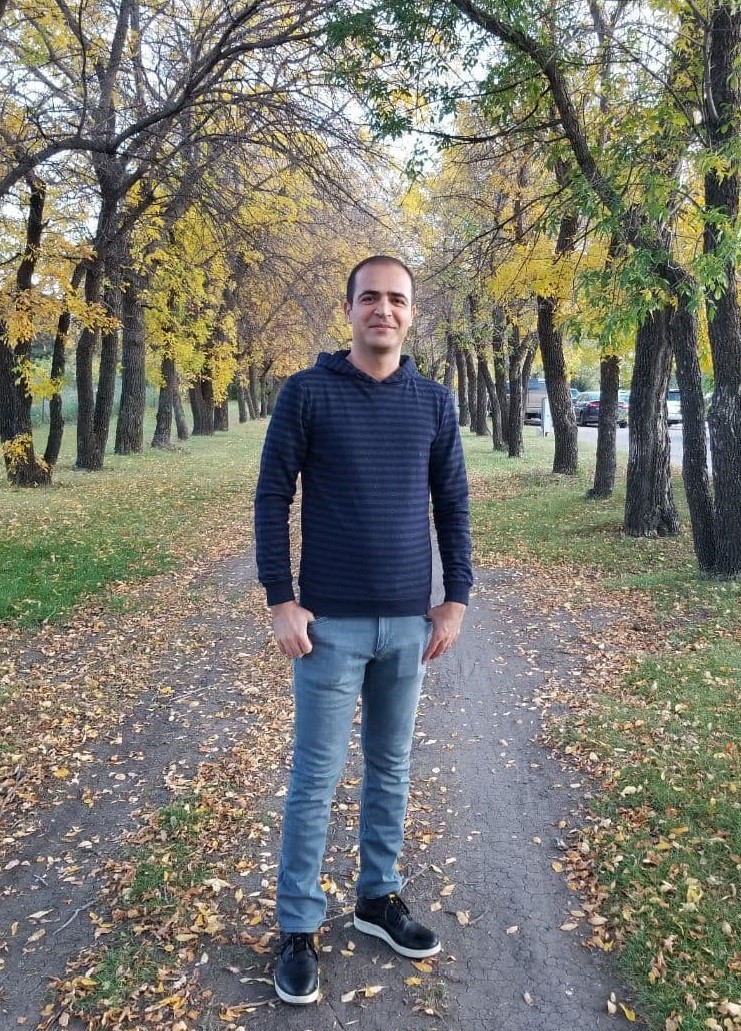
PhD Student
Mostafa Hojati is a PhD student of Soil Science at the University of Saskatchewan, and currently investigating the plant-soil-microbe interactions under the supervision of Dr. Bobbi Helgason. He completed his Bachelor’s degree in Agronomy and Plant Breeding, and his Master’s degree in Agronomy, both in Iran. Prior to joining the University of Saskatchewan, he worked as a crop production advisor in an agricultural company for four years in Iran. Mostafa’s research at the University of Saskatchewan aims to investigate soil carbon cycling and rhizosphere microbial community composition in crops with different functional traits. Using a pulse 13C‐labelling method, he will explore the effects of three crop species; wheat, canola and field pea on the belowground carbon flows and storage in different soil functional pools, and on the microbial community both at the level of broad microbial groups and at the level of bacterial and fungal orders. His research also seeks to assess the quantity and the quality of root exudates of these crop species to find the links between root exudation with soil organic carbon dynamics and nutrient availability.
Sunzid Ahmed

PhD Student
Sunzid Ahmed, a native of Bangladesh, joined The Department of Plant Science at The University of Saskatchewan in fall-2021 as a PhD student under the supervision of Dr. Bobbi Helgason and Dr. Leon Kochian. His research is focused on understanding the chemotaxis and interactions between plants and soil microorganisms to increase yields and build sustainable cultivation systems. Sunzid’s research expertise also lies in different aspects of food and environmental microbiology with specialisations in detection of multi-drug resistant bacteria from fresh food and wastewater. Sunzid received his bachelor’s and master’s degrees in Microbiology from Jashore University of Science & Technology, Bangladesh. In 2019, he was awarded with an Australia Awards scholarship to study in The University of Western Australia, where he completed a Masters of Biotechnology degree in July 2021. Outside the academic and research activities, Sunzid enjoys travelling, landscape photography, music and cooking traditional foods.
Nemat Dindarloo

PhD Student
Nemat is a Ph.D. student under the supervision of Dr. Bobbi Helgason and Dr. Melissa Arcand. Nemat's research focuses on crop residue decomposition using stable isotope tracing to understand the relationships between residue biochemical composition, carbon stabilization, and nitrogen supply. Nemat was raised on a family farm in Iran, which fostered his deep interest in agriculture from an early age. He completed his bachelor’s degree in Soil Science, followed by a master’s degree in Soil Biology and Biotechnology, both at the University of Tehran. His project supports agricultural practices that enhance soil carbon sequestration to mitigate climate change while optimizing nutrient cycling, farm productivity, and soil health. In addition to his academic pursuits, Nemat also makes time for backyard gardening, camping, and mountain climbing. The rich life experiences from Nemat's upbringing and academic background enable him to be passionate and creative about his research.
Nicolas Novoa
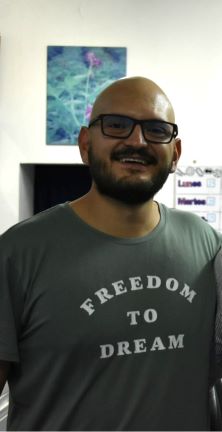
PhD Student
Nicolás was born in the beautiful city of Bogotá, Colombia. He spent much of his early childhood on the family farm, first in Mariquita and later in Yopal, where he loved playing and learning about the world around him. He started his B.S. studies in biology at La Salle University, and after graduating, he started working at the International Center for Tropical Agriculture (CIAT). There, he focused on studying cassava genetics to help improve the crop breeding program. After that, he decided to start a master's degree at the National University of Colombia. There, he studied how to use synthetic microbial communities could enhance rice straw degradation in the field. During this time, he also had the opportunity to connect with several national and international work teams, which expanded his interest in using microbes for agricultural purposes. His PhD project, overseen by Professor Bobbi Helgason, is all about exploring the pathways and microbial drivers of N2O emission in Canadian soils when they're treated with different traditional and enhanced fertilization regimens.
Silvia Silva
PhD student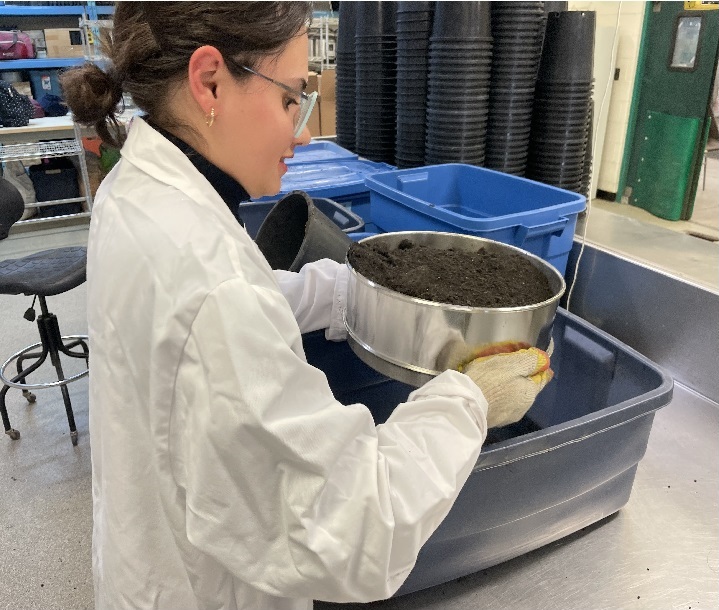
Silvia is currently pursuing a Ph.D. in Soil Sciences at the University of Saskatchewan. She holds an MSc. in Microbiology and a BSc. in Biology, both from the National University of Colombia. Throughout her career, Silvia has gained experience as a laboratory analyst in various fields, including phytopathology, soil microbiology, and quality control for plant biostimulants and biopesticides.
Her MSc. research focused on the effect of fungal inoculation in alleviating salinity stress in radish. After that, she continued to develop her curiosity about plant-microbe interactions, plant physiology, and soil microbiology.
As a Ph.D. student, Silvia is now investigating the fate of Carbon to different soil pools and evaluating the Nitrogen Use Efficiency of select lines of canola, field pea, and lentils.
Amelia Clements

MSc Student
Amelia completed her BSc in Agronomy with an Applied Microbiology Minor at the University of Saskatchewan in 2022. Over the time of her undergrad, Amelia worked for Syngenta’s R&D department, Premium Ag’s on-farm research project and BASF’s sales division. Amelia’s interests have always lied within the aspects of soil health and fertility but her drive to learn more about soil microbiology became apparent in her time working with Premium Ag, which ultimately made her decide to take an Applied Microbiology minor. Here interest in Applied microbiology led to soil science which is where she became interested in Regenerative Agriculture. She wrote her undergraduate thesis on Regenerative Agriculture and its potential to increase soil microbiology diversity and improve soil health in western Canada under the supervision of Dr. Arcand. Amelia is now a master’s student working under Bobbi Helgason researching the influence of regenerative practices on soil health. In her spare time, Amelia enjoys camping with her large family at Lake Koocanusa, wake surfing, entomology, abstract art, and dance.
Jacky Gonzalez
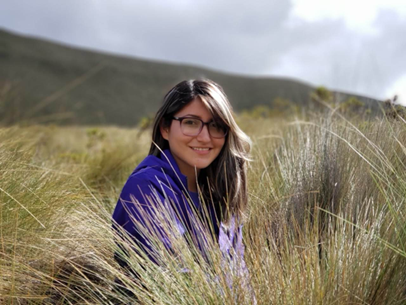
MSc Student
Jacky’s journey into the fascinating world of microbiology began in high school when she first used a microscope, examining paramecium thriving in water from a flower vase. This pivotal moment ignited her curiosity about the microbial world, leading her to pursue a BSc in Microbiology at the Pontifical Catholic University of Ecuador. Throughout her undergraduate years, she embarked on transformative internships locally and internationally in the USA and Mexico, broadening her understanding of microbial intricacies. Her passion crystallized during her thesis work on the in vitro production of EPS from fluorescent Pseudomonas isolated from hydrocarbon-contaminated clay soil. This experience solidified her commitment to exploring the profound impact of the infinitely small in nature.
Currently, under the mentorship of Dr. Bobbi Helgason, her research delves into exploring the dynamics of bacterial and fungal communities in Canola under P. brassicae and O. brassicae influence through greenhouse experiments and molecular biology analysis.
Beyond the lab, Jacky cherishes moments with her family and engages in volunteer activities with Let’s Talk Science, where they make science a blast for school and high-school students. When the lab coat comes off, you’ll find her immersed in books, taking pictures of nature, or creating something in the kitchen.
Opeyemi Adewumi
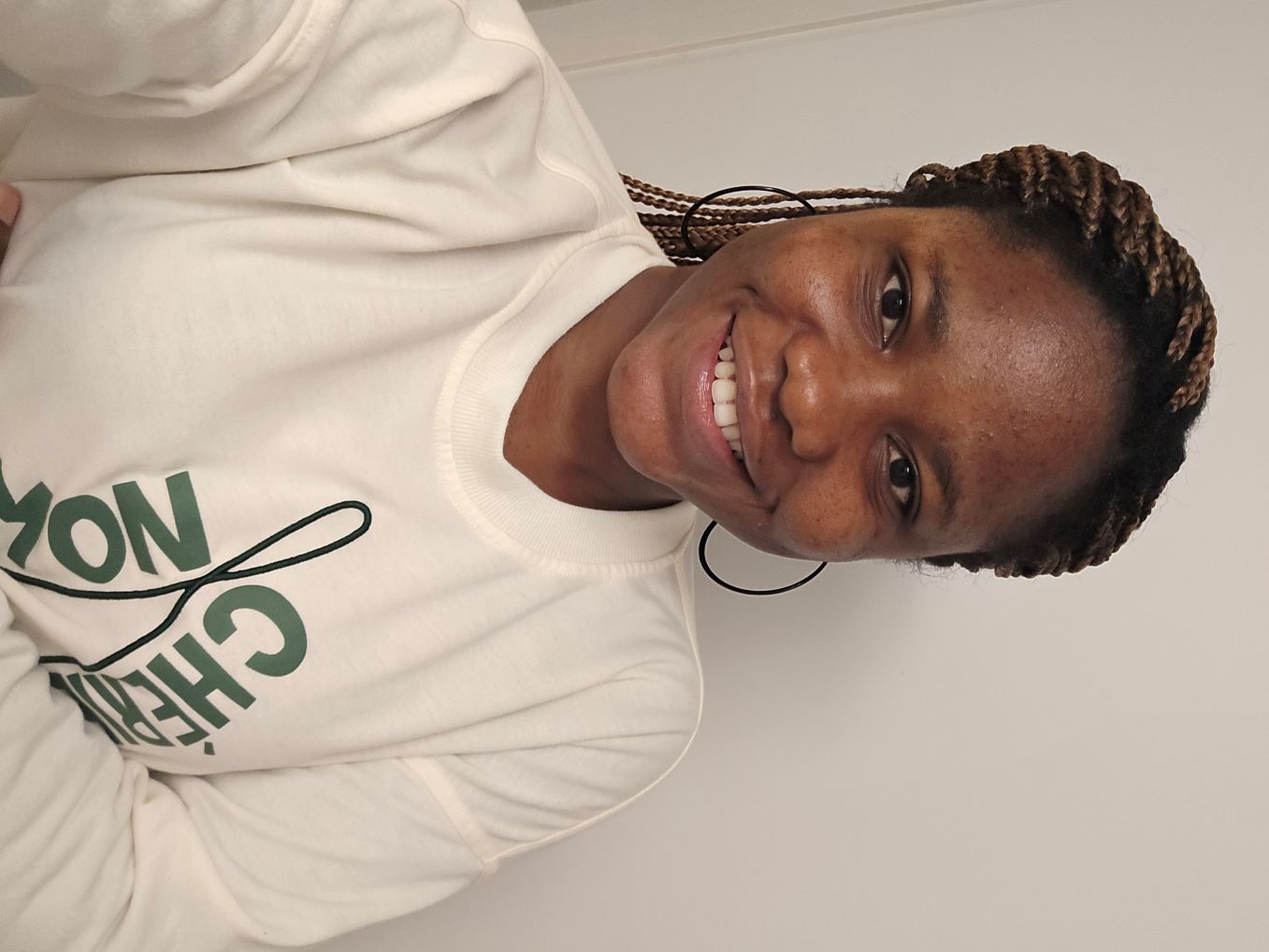
MSc Student
Opeyemi Adewumi is an M.Sc. student in the Department of Soil Science at the University of Saskatchewan, under the supervision of Dr. Bobbi Helgason and Dr. Melissa Arcand. Her research focuses on unravelling the contributions of roots and residues from different canola genotypes to soil organic matter dynamics. By using isotope tracing techniques and microbial indicators, she tracks the flux and stability of carbon and nitrogen, aiming to enhance our understanding of plant-soil-microbe interactions and their implications for soil health and greenhouse gas emissions.
Opeyemi earned her Bachelor’s degree in Soil Science and Land Resources Management from Obafemi Awolowo University, Nigeria. Her undergraduate research investigated soil organic carbon stocks under different land uses, sparking her interest in soil ecosystem dynamics and their role in climate regulation. Prior to graduate school, she worked as a research assistant in an agricultural consulting firm, where she supported projects on soil testing and sustainable land use.
She is committed to using her research to support sustainable agriculture and inform environmental policy.
Mackenzie Evans

MSc Student
Mackenzie is an MSc student of Applied Microbiology at the University of Saskatchewan, under the supervision of Dr. Bobbi Helgason. She is investigating the structure and gene expression of nitrogen-cycling soil microbial communities in Saskatchewan canola fields. Understanding these microbial community dynamics will be crucial to reducing the environmental impacts of fertilizer use.
Mackenzie is a lifelong Saskatchewan resident, and has a BSc in Cell and Molecular Biology from the University of Regina. During her undergraduate degree, she spent four semesters working as a student research assistant for Agriculture and Agri-Food Canada (AAFC).
Mackenzie developed a passion for soil microbiology while taking a course on microbial diversity. She is fascinated by the vast biodiversity of soil microbes and their enormous impact on global nutrient cycling. This curiosity inspired her undergraduate thesis, which used rRNA amplicon sequencing to identify soil microbes associated with the post-harvest decomposition of flax straw.
Before joining the University of Saskatchewan, Mackenzie worked for two years as a microbiology research technician at AAFC, where she explored the efficacy of different CRISPR gene editing systems in canola plants. Outside of the lab, she can be found spending time with family, playing musical instruments, or tending to her garden.

